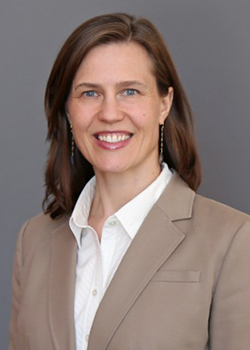 Kareen Coulombe, Assistant Professor of Engineering and Assistant Professor of Molecular Pharmacology, Physiology and Biotechnology, has received a National Science Foundation CAREER Award of $551,592 over five years. The Faculty Early Career Development Program is the National Science Foundation's most prestigious award “in support of early-career faculty who have the potential to serve as academic role models in research and education and to lead advances in the mission of their department or organization.”
Kareen Coulombe, Assistant Professor of Engineering and Assistant Professor of Molecular Pharmacology, Physiology and Biotechnology, has received a National Science Foundation CAREER Award of $551,592 over five years. The Faculty Early Career Development Program is the National Science Foundation's most prestigious award “in support of early-career faculty who have the potential to serve as academic role models in research and education and to lead advances in the mission of their department or organization.”
“The NSF CAREER Award is a significant milestone for junior faculty and we are thrilled for Kareen,” said Larry Larson, Sorensen Family Dean of Engineering at Brown. “This award will help her to continue to conduct research that could have life-changing impacts for many people.”
Coulombe’s award is for “understanding atrial arrhythmia mechanisms with patient-derived engineered tissues.” Atrial fibrillation (AFib) is the most common disorder of electrical conduction in the heart diagnosed in patients and leads to poor blood flow, blood clots, stroke, heart attack, and other cardiac complications, including heart failure. Another common arrhythmia diagnosis (in 1-3 out of 1000 people) is Wolff-Parkinson-White (WPW) syndrome, which is classified as having accessory activation paths in the atria of the heart causing super fast heart rates (in 70 percent of patients) or AFib. With 97 percent of WPW patients not having an inherited gene mutation, diverse genetics and other factors are likely what lead to these relatively common atrial arrhythmias. However, how these arrhythmias arise is poorly understood and requires carefully designed and controlled cellular and tissue models in order to study the individual roles of arrhythmic triggers, like biochemical, biomechanical, and emotional stress.
In Coulombe’s NSF project, the main objective is to better understand what initiates atrial arrhythmias in non-inherited WPW syndrome. To do this, her team will develop novel human tissue models in the dish and computational models that enable studying arrhythmic phenotypes in electrical and contractile function. They will generate patient-derived human induced pluripotent stem cells (hiPSCs) and differentiate them into atrial cardiomyocytes to form 3D engineered tissues for assessing physiological function. They will test how mechanical stretch (a correlate of high blood pressure) and emotional stress (by chemical activation of the “fight-or-flight” response) alter automaticity, frequency-dependent contractions, and electrical conduction in collaboration with Dr. Bum-Rak Choi (RI Hospital) to reveal reentry pathways leading to arrhythmia.
Coulombe specializes in cardiovascular regenerative engineering to address global needs to develop novel therapies for cardiovascular disease. The broader impacts of her research program in heart regeneration and health are to ultimately improve the health and quality of life for patients with cardiac disease. Her heart regeneration work aims to accelerate vascular and electromechanical integration of engineered tissue with the injured and failing host heart in order to restore cardiac contractility. Her work in predictive in vitro cardiac models has focused on cardiotoxicity assessment and now will expand into disease models of atrial arrhythmia.
Coulombe has been the recipient of several University honors and awards for both research and teaching in her career, including a 2020 Brown Biomedical Innovation to Impact Award and the inaugural 2019 Brown University Dean’s Award for Excellence in Mentoring in Engineering. She currently serves as the Director of Graduate Studies in Biomedical Engineering. She earned a B.S. in biomedical engineering at the University of Rochester summa cum laude in 2001 and was a Whitaker pre-doctoral fellow, earning a Ph.D. in bioengineering at the University of Washington in 2007. Coulombe was an NIH Ruth L. Kirschstein post-doctoral fellow in pathology and bioengineering at the University of Washington where she won an NIH Pathway to Independence K99/R00 award in 2012. She joined the faculty at Brown in 2014.